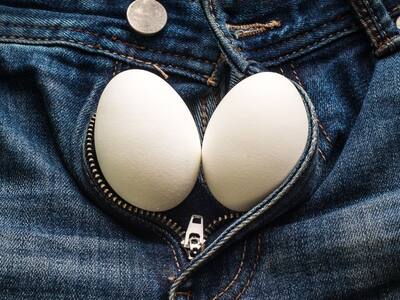
Men should consume particular foods that can improve sperm production and avoid others that can harm fertility in addition to leading a healthy lifestyle. Read on to know more.
In the pursuit of creating life, male infertility is an increasingly prevalent issue that demands attention and proactive solutions. While research into the numerous factors contributing to male infertility is still going, the importance of a balanced food plan cannot be understated. It has become clear that the food we eat has a significant impact on our general health, including our ability to reproduce. Therefore, following a healthy diet may increase male fertility and open the door to a better future.
Nutritional inadequacies, oxidative stress, hormonal imbalances, and general sperm quality are all intertwined in the relationship between food and male fertility. Essential nutrients, antioxidants, and phytochemicals are provided by a balanced diet rich in fruits, vegetables, whole grains, lean proteins, and healthy fats, which support reproductive health. These foods can promote ideal sperm production, motility, and morphology when included in a person’s diet.
What Diet Should You Follow To Boost Your Fertility?
An abundance of vibrant fruits and vegetables is the first tenet of a fertility-enhancing diet. These organic powerhouses fight oxidative stress by being high in beta-carotene, vitamins C and E, and other antioxidants, which lessen the harm done to sperm DNA. Furthermore, including foods high in antioxidants like berries, citrus fruits, spinach, and broccoli improves healthy sperm function and guards against aberrant sperm development.
Complex carbs, fiber, and vital B vitamins can all be found in whole grains like brown rice, quinoa, and oats. These nutrients aid in the control of hormones, helping to keep healthy testosterone levels in check. In addition to helping with blood sugar management, whole grains can improve fertility because too much sugar consumption can mess with hormone balance.
Food You Must Eat
Lean sources of protein, such as fish, chicken, beans, and nuts, provide a great foundation for male fertility. These foods offer vital amino acids, which serve as the building blocks for the creation of sperm. Omega-3 fatty acids, which are present in seafood like salmon and sardines, are also advantageous for the mobility and structural integrity of the sperm membrane.
Although they are frequently misunderstood, healthy fats are essential for male reproductive health. Consuming monounsaturated and polyunsaturated fats, such as those found in avocados, olive oil, and almonds, can enhance hormone balance and sperm quality. These fats also aid in the absorption of fat-soluble vitamins, increasing the overall effectiveness of a diet designed to promote fertility.
READ RELATED: Expert-Backed Skincare Tips To Keep Your Skin Healthy This Monsoon
Fertility Boosting Diet
It is crucial to remember that a fertility-boosting diet is not a magic fix-all but rather a necessary element of a healthy lifestyle. a comprehensive strategy for treating male infertility. For comprehensive fertility care, additional lifestyle factors including consistent exercise, stress management, and abstaining from dangerous substances like tobacco and excessive alcohol should be considered. Source of Vit E – almonds, walnut, and Use of fig”
Additionally, incorporating whole grains, lean proteins, and dark green vegetables into one’s diet can contribute to male fertility. Whole grains, rich in fiber and B vitamins, along with lean protein, crucial for muscle tissue and zinc, offer valuable nutrients. Dark green vegetables, such as spinach, kale, and broccoli, are packed with vitamins, minerals, antioxidants, and folate, which aid in digestion, reduce inflammation, enhance overall health, and provide essential nutrients for male fertility. Certain specific foods have also been shown to be beneficial for male fertility. Citrus fruits, for instance, provide vitamin C, an antioxidant that protects sperm from damage. Tomatoes offer lycopene, known to improve sperm quality and quantity. Spinach is a good source of folate, vital for cell division and DNA production. Fenugreek (methi) is a herb that has shown promising effects in improving sperm motility. Walnuts are rich in omega-3 fatty acids, which improve sperm health. Eggs provide protein and other vital nutrients necessary for sperm production. Potassium-rich bananas and healthy fat-containing avocados are also beneficial. Oily fish, like salmon, tuna, and mackerel, are excellent sources of omega-3 fatty acids, while carrots offer beta-carotene, converted to vitamin A, which is important for sperm production.
Bottom Line
In conclusion, when it comes to male fertility, the wise saying “You are what you eat” has a profound significance. Improved reproductive health may result from adopting a food plan high in fruits, vegetables, whole grains, lean meats, and healthy fats. Although individual outcomes may vary, it is important to recognize the role that diet plays in promoting healthy sperm function, production, and DNA integrity. By providing the correct nutrients to our bodies, we not only invest in our overall health but also in the potential for a better future for prospective fathers around the world. In addition to maintaining a healthy diet, other lifestyle factors can enhance male fertility. Regular exercise is beneficial for overall well-being and fertility; however, excessive exercise should be avoided as it can hinder sperm production. If overweight or obese, losing excess weight can improve sperm health. It is important to limit alcohol consumption, as excessive intake can damage sperm and fertility. Opting for moderate alcohol consumption is advisable. By incorporating regular exercise, maintaining a healthy weight, and limiting alcohol intake, men can enhance their fertility and overall reproductive health.
Total Wellness is now just a click away.
Follow us on
Don’t Miss Out on the Latest Updates.
Subscribe to Our Newsletter Today!
window.addEventListener(‘load’, (event) => {
$(‘#commentbtn’).on(“click”,function(){
(function(d, s, id) { var js, fjs = d.getElementsByTagName(s)[0]; if (d.getElementById(id)) return; js = d.createElement(s); js.id = id; js.src = “//connect.facebook.net/en_US/sdk.js#xfbml=1&version=v2.3”; fjs.parentNode.insertBefore(js, fjs);}(document, ‘script’, ‘facebook-jssdk’));
$(“.cmntbox”).toggle();
});
});







